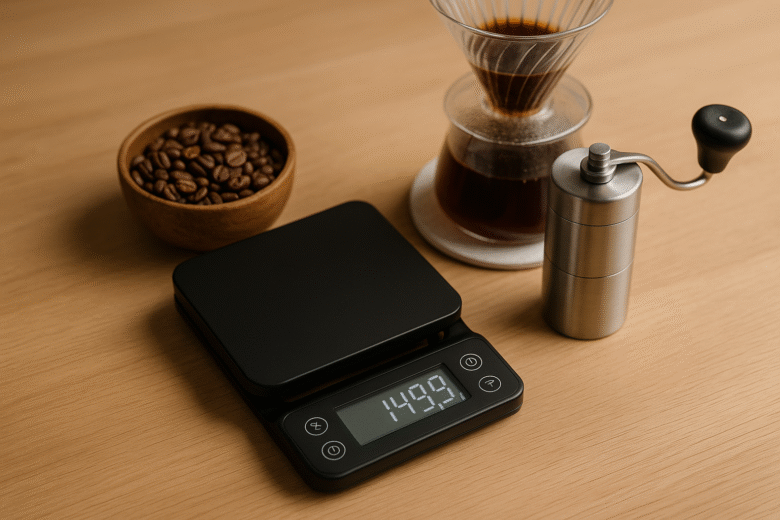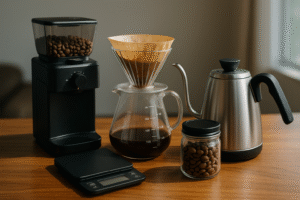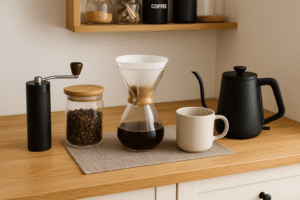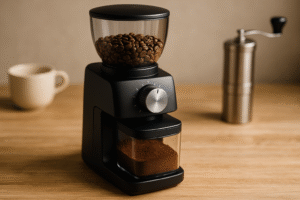Precision plays a huge role in brewing great coffee. While most beginners focus on beans, brewers, and grinders, one tool often gets overlooked: the coffee scale.
To some, it may seem excessive. But for anyone looking to consistently improve their brew, a scale is not just helpful—it’s essential.
Measuring by weight rather than volume leads to better control, repeatability, and ultimately, better flavor. In this guide, you’ll learn why a coffee scale matters and how to choose one that suits your brewing style.
Why Not Just Use Spoons or Scoops?
Coffee beans vary in size, density, and roast level. A tablespoon of one roast might weigh 7 grams, while another weighs 10 grams. This inconsistency makes scoops unreliable.
Brewing is a chemistry process. The coffee-to-water ratio directly affects extraction. Too much coffee? Your brew is bitter. Too little? It’s watery and sour.
Using a scale ensures your ratio is accurate every time—no guessing, no surprises. It removes one of the biggest variables in brewing.
Precision and Consistency
With a scale, you can replicate your favorite recipe exactly. You’ll know how much coffee and how much water to use down to the gram.
Let’s say your ideal recipe is 18g of coffee to 300g of water. You can recreate that balance every single time—whether you’re brewing for yourself or guests.
Consistency is key for learning what works. Without precision, it’s hard to know whether flavor issues are caused by the grind size, temperature, or amount of coffee used.
Better Coffee-to-Water Ratios
Ratios are the foundation of every brewing method. A scale lets you follow popular ratios like:
- 1:15 (one part coffee to 15 parts water) for pour-over
- 1:16 for French press
- 1:2 for espresso
When you brew by weight, you’re working with accurate proportions, not just approximations.
This leads to more balanced flavors and helps you dial in your ideal brew strength.
Real-Time Control for Pour-Overs
For manual methods like pour-over or Chemex, a scale helps you manage both weight and timing.
Many coffee scales come with built-in timers, allowing you to track the bloom phase and total brew time.
This control helps avoid over- or under-extraction. You can watch the weight as you pour, ensuring even flow and consistent saturation.
Without a scale, it’s difficult to measure how much water you’re adding during each pour stage.
Espresso and the Importance of Ratio
In espresso, precision is everything. Baristas often use a 1:2 ratio, such as 18g of ground coffee to 36g of liquid espresso.
Weighing your input and output allows you to monitor extraction yield, helping you dial in grind size and shot time.
Even a 1g difference can affect shot quality. For anyone serious about espresso, a scale is a non-negotiable tool.
Some espresso machines even come with built-in scales to streamline the process.
Helping You Learn Faster
When you’re learning to brew better coffee, a scale acts as a reference point. You can track what worked, what didn’t, and make adjustments.
This makes the learning process faster, clearer, and less frustrating.
Without weight data, troubleshooting is guesswork. With it, you’re practicing real technique.
You’ll gain confidence in your method and develop a deeper understanding of your equipment and ingredients.
Travel and Consistency On-the-Go
If you travel or work from different locations, a portable coffee scale helps you recreate your favorite brew anywhere.
It’s especially useful with compact brewers like AeroPress or pour-over kits.
Lightweight battery-powered models fit easily in a bag and add minimal bulk.
Even when using unfamiliar water, beans, or grinders, you can rely on your usual ratio and method.
What to Look for in a Coffee Scale
Not all scales are created equal. Here are some features to consider:
Accuracy and Precision
Look for a scale that measures in 0.1-gram increments, especially if you brew espresso.
Speed
Fast response time helps avoid over-pouring. Laggy scales make brewing more difficult.
Built-In Timer
Useful for pour-over and AeroPress. Allows you to control blooming and total brew time.
Size and Portability
Compact scales fit easily under drippers or espresso cups. Large scales may not work well with all equipment.
Water Resistance
Accidents happen. Choose a scale with water resistance or a removable rubber mat.
Battery Life or Rechargeable
USB-charging models are convenient, but battery-powered scales often last longer between charges.
Popular Coffee Scale Brands
Trusted brands known for coffee-focused scales include:
- Hario – Simple, durable, reliable.
- Timemore – Stylish and feature-rich, with fast response times.
- Acaia – High-end smart scales with Bluetooth, apps, and real-time feedback.
- Jennings – Affordable option with decent accuracy.
- Brewista – Balanced price and performance with timer and precision.
Choose based on your needs. A beginner doesn’t need a $200 Acaia, but a reliable $30 scale can go a long way.
How to Use a Scale in Your Routine
Weigh your beans before grinding. This ensures you don’t waste coffee or miscalculate.
Weigh your water. Instead of measuring in milliliters or using a kettle with marks, pour directly into your brewer on the scale.
Track your total brew weight. Especially for pour-over, espresso, or AeroPress, it helps fine-tune your method.
Record your recipes. Take notes of weights and times, and adjust based on taste. You’ll soon find your favorite formula.
Scale Alternatives (And Why They Fall Short)
Kitchen spoons and measuring cups are too imprecise. Even food scales designed for baking may not measure in small enough increments for espresso.
Phone apps or “scoop counters” don’t provide enough consistency for serious brewing.
If you’re investing in quality beans and equipment, a proper scale ensures you’re getting the best from them.
Conclusion: A Small Tool With Big Impact
A coffee scale is one of the simplest yet most effective tools to improve your brewing.
It helps you achieve balance, consistency, and confidence—whether you’re making pour-over, espresso, French press, or AeroPress.
Once you start brewing by weight, you’ll wonder how you ever did it any other way.
It’s a small investment that delivers daily rewards in every cup.

Marcio Luzardo is a coffee enthusiast and the voice behind Tudo Viraliza. With a passion for turning curiosity into practical knowledge, he shares easy-to-follow tips, guides, and insights to help readers enjoy better coffee every day. When he’s not writing, Marcio is exploring new brewing methods or diving into the rich stories that connect coffee to culture, lifestyle, and wellness.



